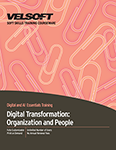Course outline for
AI and Critical Thinking
AI and Critical Thinking Course Outline

Session One: Course Overview
Course Overview
Learning Objectives
Pre-Assignment
Pre-Course Assessment
Session Two: Introduction to AI
Artificial Intelligence
Ethics and Social Implications of AI
Case Study: Real-World Example of AI Bias
Session Three: Critical Thinking with AI
Critical Thinking
Evaluating an AI News Article or Product Claim
Session Four: Machine Learning and Algorithms
How Machine Learning Works
Overview of Algorithms Commonly Used in AI
The Practical Applications and Challenges of Machine Learning
Session Five: Advanced Ethics and AI Safety
Detailed Discussion on Data Privacy and AI Security
The Role of AI in Surveillance and Personal Freedoms
Balancing Innovation with Ethical Concerns
Session Six: Case Studies of AI Implementations
AI in Various Industries: Opportunities and Challenges
Case Study: AI Implementation in Supply Chain Management by DHL
AI Implementations
Session Seven: Philosophical and Future Aspects of AI
AI and Consciousness: Philosophical Debates
The Potential for Artificial General Intelligence (AGI)
The Future Impact of AI on Society
Philosophical And Future Aspects of AI
Session Eight: AI Guidelines and Policies
Developing Draft AI Guidelines and Policies: A Collaborative Starting Point
Defining Core Principles for AI Ethics Guidelines
Session Nine: Critical Evaluation of AI Systems
Understanding AI Robustness, Reliability, and Limitations
Reliability In AI Systems: Importance and Maintenance
Areas Where AI Can Be Helpful in Critical Thinking
Personal Action Plan
Course Summary
Post-Course Assessment
Pre- and Post-Course Assessment Answer Key
Pre-Course Assessment
Post-Course Assessment
Assignment Answer Key
Session Two: Introduction to AI
Session Three: Critical Thinking with AI
Session Four: Machine Learning and Algorithms
Session Five: Advanced Ethics and AI Safety
Download this course as a demo
Complete the form below and we'll email you an evaluation copy of this course:
Video
More Course Outlines in this Series
- Implementing AI in Your Workplace
- Microsoft Excel 2010: Part One
- Microsoft Excel 2010: Part Two
- Microsoft Excel 2010: Part Three
- Microsoft Excel 2010: PowerPivot
- Microsoft Excel 2010 and Visual Basic for Applications
- Microsoft PowerPoint 2010: Part One
- Microsoft PowerPoint 2010: Part Two
- Microsoft Access 2010: Part One
- Microsoft Access 2010: Part Two
- Microsoft Word 2010: Part One
- Microsoft Word 2010: Part Two
- Microsoft Word 2010: Part Three
- Microsoft Outlook 2010: Part One
- Microsoft Outlook 2010: Part Two
- Microsoft OneNote 2010
- Digital Transformation: Technology and Digital Skills
- Digital Transformation: Communication and Sales Channels
- Digital Transformation: Organization and People
- Digital Transformation Overview
- AI and Critical Thinking
- Digital Transformation: Processes
- AI and Problem Solving
- Digital Transformation: Strategy
- Digital Transformation: Data and Analytics
- AI and Project Management
